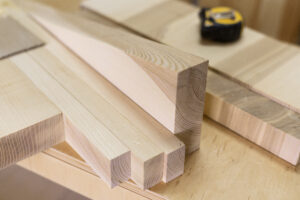When it comes to upgrading your home’s flooring, the decision between LVP flooring vs engineered hardwood can be a tough one. Both options offer unique benefits, aesthetics, and practicalities, making them popular choices for homeowners across the United States. At USFMHi, we understand the importance of selecting a flooring material that aligns with your lifestyle, budget, and design preferences. In this comprehensive guide, we’ll break down the key differences between luxury vinyl plank (LVP) flooring and engineered hardwood, helping you make an informed choice for your home.
What Is LVP Flooring?

Luxury vinyl plank LVP flooring is a synthetic flooring option designed to mimic the look of natural wood. Made from multiple layers of vinyl, LVP is highly durable, water-resistant, and versatile. It comes in a variety of styles, colors, and textures, allowing homeowners to achieve the appearance of hardwood without the high maintenance or cost. LVP is constructed with a strong core layer, a printed design layer that replicates wood grains, and a protective wear layer to guard against scratches and stains.
Understanding Engineered Hardwood

Engineered hardwood, on the other hand, is a hybrid flooring material that combines a thin layer of real hardwood with a core of plywood or high-density fiberboard. This construction makes it more stable than solid hardwood, as it’s less prone to warping or shrinking due to moisture and temperature changes. Engineered hardwood offers the authentic beauty of wood with a more affordable price tag than solid hardwood, making it a favorite for homeowners seeking a natural aesthetic.
Durability and Maintenance Comparison
When evaluating LVP flooring vs engineered hardwood, durability is a critical factor. LVP flooring is exceptionally resilient, particularly in high-traffic areas. Its water-resistant properties make it ideal for kitchens, bathrooms, and basements, where spills and humidity are common. LVP requires minimal maintenance—just regular sweeping and occasional mopping with a mild cleaner. It’s also resistant to scratches and dents, making it a great choice for homes with pets or children.
Engineered hardwood, while durable, is more susceptible to moisture damage than LVP. It can handle moderate traffic but may show wear in busy households. Maintenance involves regular sweeping, occasional damp mopping, and refinishing every few years to maintain its luster. Unlike LVP, engineered hardwood can be scratched or dented, requiring more careful upkeep to preserve its appearance.
Aesthetic Appeal and Design Options
Both LVP and engineered hardwood offer stunning visual appeal, but they cater to slightly different preferences. LVP flooring excels in versatility, with designs that can replicate everything from rustic oak to sleek walnut. Its printed design layer allows for endless customization, including trendy gray tones and distressed finishes. For homeowners who want a modern or unique look, LVP provides flexibility without sacrificing style.
Engineered hardwood, however, brings the authentic warmth and texture of real wood. Each plank features natural grain patterns, giving it a timeless, elegant look that’s hard to replicate. While it may not offer the same range of colors as LVP, engineered hardwood appeals to those who value the organic beauty of wood and want a premium, classic aesthetic in their home.
Cost Considerations
Budget plays a significant role in the decision between LVP flooring vs engineered hardwood. LVP is generally more affordable, with prices ranging from $2 to $7 per square foot, depending on the quality and brand. Installation costs are also lower, as LVP often comes with click-lock systems that simplify the process, making it a DIY-friendly option for many homeowners.
Engineered hardwood tends to be pricier, with costs ranging from $4 to $12 per square foot, not including installation. Professional installation is often recommended due to the precision required, which can add to the overall expense. However, engineered hardwood may increase your home’s resale value, as many buyers view real wood as a premium feature.
Environmental Impact and Sustainability
Sustainability is another key consideration for eco-conscious homeowners. LVP is made from synthetic materials, primarily PVC, which is not biodegradable. However, many manufacturers now offer LVP with recycled content or low-VOC (volatile organic compound) certifications, reducing its environmental footprint. Still, its synthetic nature makes it less eco-friendly than natural materials.
Engineered hardwood is generally considered more sustainable, as it uses a thin layer of real wood, reducing the demand for harvesting compared to solid hardwood. Many brands source wood from responsibly managed forests, and some offer FSC-certified options. However, the adhesives and finishes used in engineered hardwood can contain VOCs, so it’s important to choose products with eco-friendly certifications.
Installation and Versatility
LVP flooring is known for its ease of installation. Most LVP products feature a click-and-lock system, allowing for floating floor installations that don’t require glue or nails. This makes it a versatile choice for various subfloors, including concrete and existing tile. LVP can also be installed in moisture-prone areas, making it suitable for nearly any room in the home.
Engineered hardwood offers more installation options, including glue-down, nail-down, or floating methods. However, it’s less forgiving in terms of subfloor preparation and requires careful acclimation to avoid issues with expansion or contraction. While it can be used in many areas, it’s not recommended for high-moisture spaces like bathrooms unless specifically treated.
Longevity and Resale Value
When it comes to longevity, both flooring types have their strengths. High-quality LVP can last 15–20 years with proper care, especially in low-maintenance environments. Engineered hardwood can last 20–30 years or more, particularly if it’s refinished periodically. The ability to sand and refinish engineered hardwood extends its lifespan, unlike LVP, which cannot be refinished.
In terms of resale value, engineered hardwood often has an edge, as buyers tend to associate real wood with luxury and durability. However, high-end LVP can also appeal to buyers looking for low-maintenance, stylish flooring, especially in modern or family-friendly homes.
Making the Right Choice for Your Home
Ultimately, the choice between LVP flooring vs engineered hardwood depends on your priorities. If you need a budget-friendly, low-maintenance, and water-resistant option, LVP is an excellent choice, particularly for busy households or moisture-prone areas. If you value the authentic look and feel of wood and are willing to invest in maintenance and higher upfront costs, engineered hardwood may be the better fit.
At USFMHi, we recommend assessing your lifestyle, budget, and aesthetic goals before deciding. Both LVP and engineered hardwood offer distinct advantages, and the right choice will enhance your home’s beauty and functionality for years to come. Visit our website for more flooring insights and inspiration to create the perfect space for your family.
